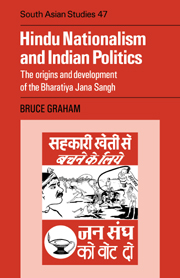Book contents
- Frontmatter
- Contents
- List of illustrations
- List of tables
- Preface
- List of abbreviations
- 1 The challenge of Hindu nationalism
- 2 The immediate origins of the Jana Sangh
- 3 The doctrinal inheritance of the Jana Sangh
- 4 The leadership and organization of the Jana Sangh, 1951 to 1967
- 5 The Jana Sangh as a Hindu nationalist rally
- 6 The Jana Sangh and interest-group politics
- 7 The Jana Sangh in electoral politics, 1951 to 1967
- 8 Conclusion
- Appendix I
- Appendix II
- Appendix III
- Appendix IV
- Select Bibliography
- Index
- CAMBRIDGE SOUTH ASIAN STUDIES
2 - The immediate origins of the Jana Sangh
Published online by Cambridge University Press: 06 July 2010
- Frontmatter
- Contents
- List of illustrations
- List of tables
- Preface
- List of abbreviations
- 1 The challenge of Hindu nationalism
- 2 The immediate origins of the Jana Sangh
- 3 The doctrinal inheritance of the Jana Sangh
- 4 The leadership and organization of the Jana Sangh, 1951 to 1967
- 5 The Jana Sangh as a Hindu nationalist rally
- 6 The Jana Sangh and interest-group politics
- 7 The Jana Sangh in electoral politics, 1951 to 1967
- 8 Conclusion
- Appendix I
- Appendix II
- Appendix III
- Appendix IV
- Select Bibliography
- Index
- CAMBRIDGE SOUTH ASIAN STUDIES
Summary
In a large measure, the shape of India's party system after independence depended upon the changes which were taking place in the Indian National Congress, that huge and widely spread political association which had headed the nationalist movement during the days of the British Raj. Given its aim of achieving the greatest possible degree of unity amongst the Indian people, the Congress had grown accustomed to absorbing, and to some extent reconciling, a wide range of political ideas. In 1947 it contained within its ranks representatives of three important intellectual groups with quite definite but divergent views of what form the new polity should take. Of these, the first wished to see India as a liberal-democratic state with a constitution that was both secular and parliamentary in character; the second hoped for the formation of a socialist state in which collectivist principles governed social and economic organization; and the third was working to realize a state which embodied Hindu traditions and values. Each of these three groups exerted considerable influence within Congress and yet none was fully enclosed within it, for each one was generating its own distinctive pressure groups outside Congress boundaries. In the normal course of events, the tension between such bodies of opinion might have produced a multi-party system of some kind in the new state, but in India such an outcome was unlikely in view of the firm hold which Congress had established over its political life.
- Type
- Chapter
- Information
- Hindu Nationalism and Indian PoliticsThe Origins and Development of the Bharatiya Jana Sangh, pp. 5 - 42Publisher: Cambridge University PressPrint publication year: 1990
- 1
- Cited by



